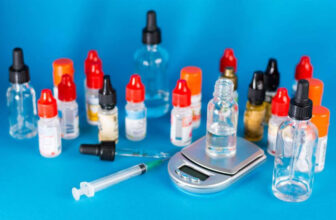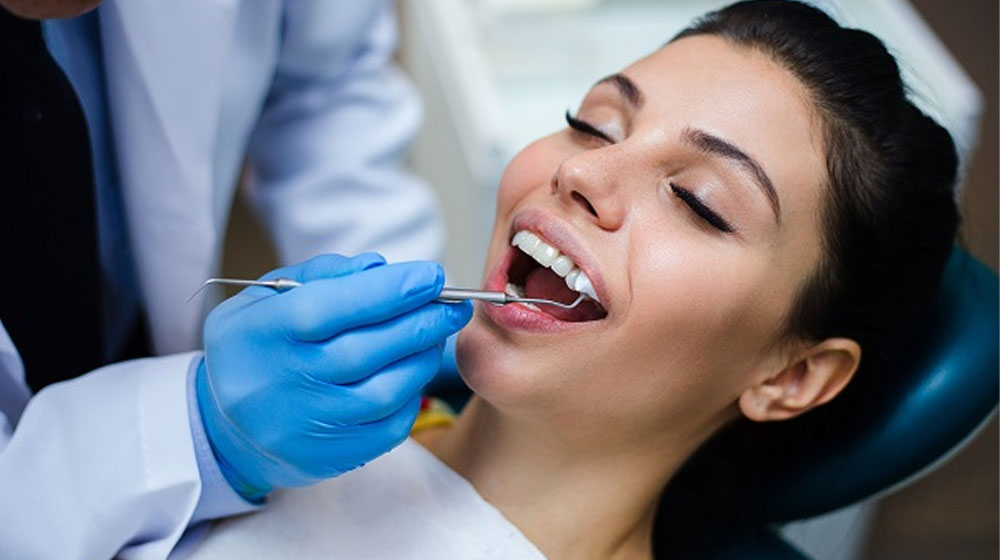
There is a lot of discussion on how vaping impacts our oral health. There is still a common lack of concrete data to draw the right conclusions about many aspects of vaping impact on our health in general.
While it is usually understood that vaping is around 95 percent less harmful than smoking, it is vital to remember that this does not mean it is risk-free. This contains potential impacts on your oral health.
We have taken a closer look at many of these oral health problems in our blog: Can vaping cause gum issues? And does vaping stain teeth? Anyway, here we will explore whether or not your dentist can tell if you have been vaping.
How can the dentist tell if you vape?
There are not actually any tests a dentist can perform to test whether you vape or not, there are some giveaway signs that a dentist might look for.
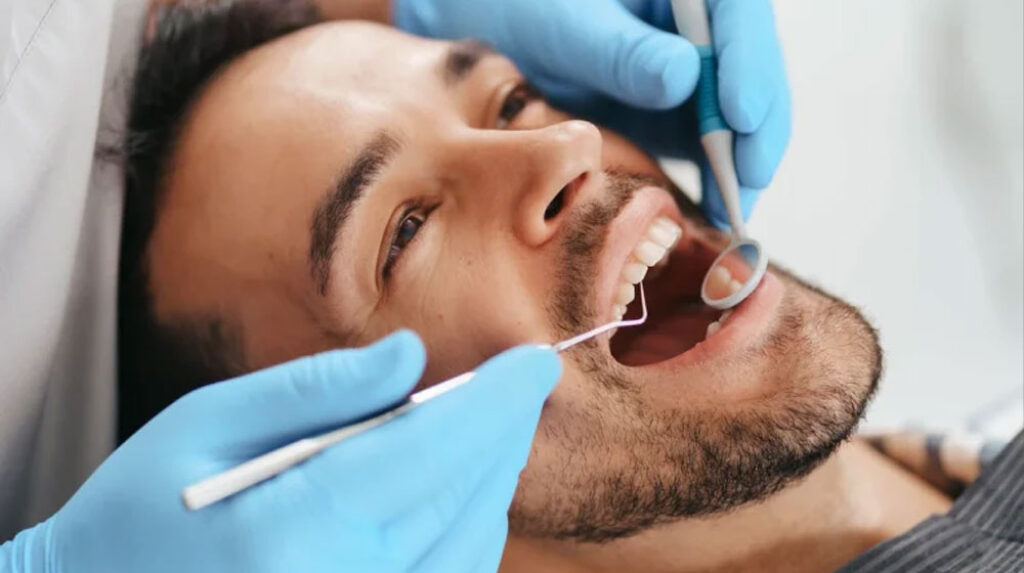
Some of the most general include:
Discoloration of tongue and teeth
E-cigarette and vaping can cause your tongue and teeth to stain. Over time, these stains can become more pronounced and hard to remove.
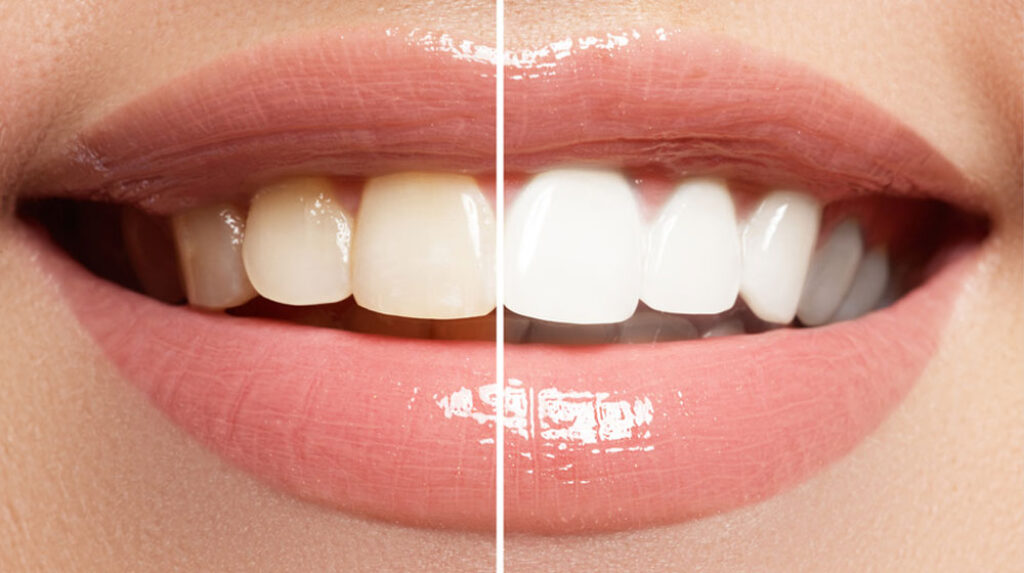
Well, if your e-liquid contains nicotine, this will be more risky, the nicotine can damage your gums and teeth. That is because nicotine constricts blood vessels which can result in bad circulation, which in turn leads to decreased blood flow to the gums. This can cause gum tissue to become inflamed and even infected, causing to periodontal disease, tooth decay, and finally tooth loss.
Plus, when nicotine combines with saliva, it can stain your teeth yellow.
Higher risk of gum diseases
Vaping can also raise your chances of developing gum problems. A study in iScience found that 72.5 percent of cigarette smokers lead to gum disease, and 42.5 percent of those who vape had it. Anyway, only 28.2 percent of nonsmokers showed signs of periodontal disease. So, while the chances of gum disease are not as high as with using cigarettes, vaping does not raise the danger of periodontal disease.
Signs of gum disease include irritation or inflammation in the gums or bleeding when brushing. Schedule a visit with your dentist if you notice any of these symptoms.
Dry mouth and irritation
Vaping can lead to dry mouth, as the chemicals in e-cigarettes can decrease saliva production.
Dry mouth is not just uncomfortable but also raises the risk of gum and cavities disease. Dentists might notice signs of dry mouth and its related effects during an examination.
Bad breath
While more generally linked to smokers, vapers can also have bad breath. While in this instance the dentist may not quickly blame vaping, if the bad breath is the result of oral health problems it may become clearer as they investigate those problems.
Mouth sores
Some people may experience ulcers or mouth sores due to vaping.
How to maintain the best oral hygiene when vaping
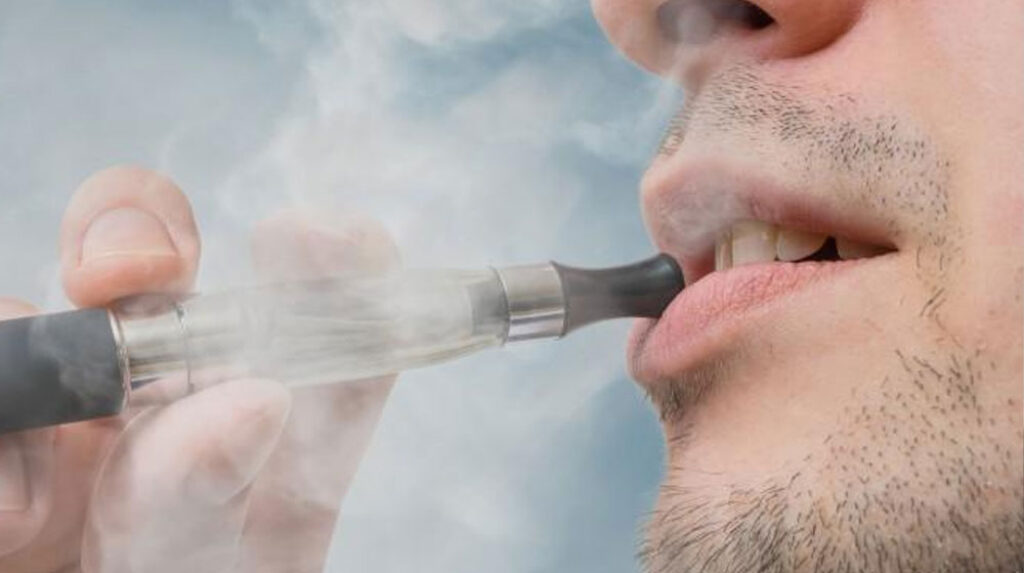
These tips will protect you from carcinogens, sugars, and plaque builders of all types, whether they are coming from vaping or elsewhere.
Flossing
The research presents that flossing has been attached to a big range of oral health advantages, including combating dirty breath, removing plaque from below the gum line, fighting tartar buildup, and reducing cavity risk.
If you want to stay on top of your oral hygiene, you have to begin flossing regularly. It is unnecessary to floss twice a day, mainly if you don’t eat anything between your morning and bedtime brushes. But you can carry floss around with you to get pesky crumbs out from between your teeth all through the day.
Brushing your teeth regularly
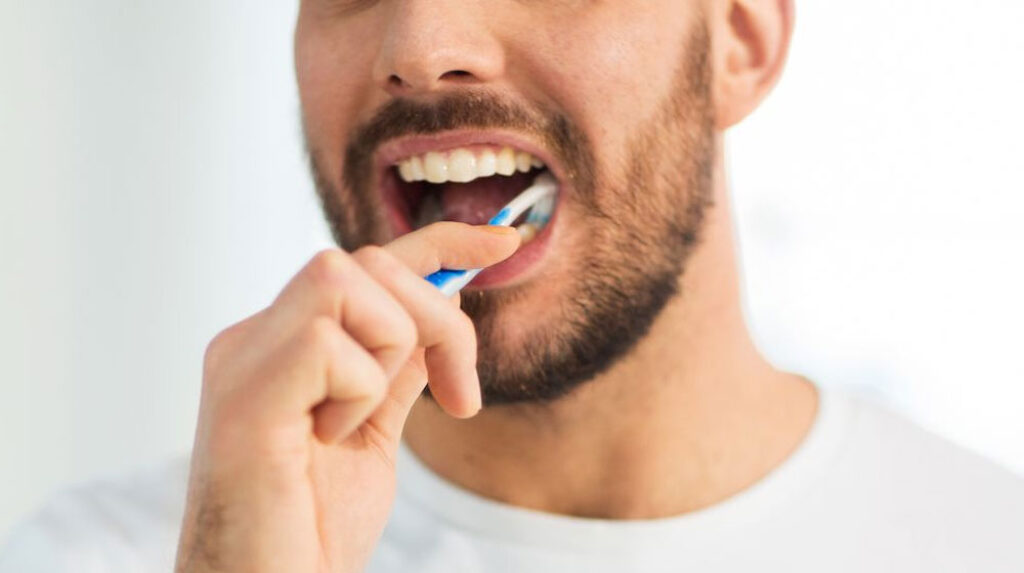
The clearest step you can take to maintain best oral hygiene is to brush regularly. Dentists advise brushing at least twice a day, two minutes per session.
When you brush, make circular motions, and don’t press to hard. Pressing hard would not be better nay more plaque than pressing lightly, and actually, it can destroy your gums. Don’t leave any corner of your teeth unbrushed, you can even brush your tongue.
Using mouthwash
Mouthwash is another important tool in the fight against bad oral hygiene. After you brush and floss, rinse your mouth with a sweet gulp of mouthwash, but don’t shallow. It will leave your teeth sparkling clean but is not good to ingest.
Mouthwash will catch the remaining bits of food and other particles and dissolve them before they can start to destroy your teeth.
Drink lots of water
Water is an initial dietary source of fluoride, and fluoride is best for our teeth. Water also replenishes our electrolytes, hydrates us, and permits our gums to cycle through fluids so that they stay in fit, working situation. That is why water is so essential for oral hygiene.
Hydration also helps keep dirty breath at a minimum. If you notice you have persistent dirty breath, it may be a sign that something is wrong with your teeth.
Limit sugar intake
The fight for fit teeth starts long before you ever take a brush to your mouth. Restricting your sugar intake goes a long way in protecting your teeth and gums against plaque and tartar buildup. This is especially vital when it comes to artificial sugars, which have a markedly higher incidence of gum problems.
Regular dental check-ups
Regular dental check-ups are vital for every person, but they are mainly vital if you are a vaper. Your dentist can help identify any potential oral health issues early on.
How does nicotine impact gums?

Nicotine is a very addictive substance that is found in vapes. Most teenagers are not aware of the effect that nicotine can have on their mouths. These are some of the ways that nicotine impacts your gum and teeth after excessive vaping:
Reduce blood flow
Nicotine causes blood vessels to limit, reducing blood flow to their gums. This can damage the gums and cause other oral problems, making them more susceptible to diseases and infections.
Impaired healing
Nicotine impairs the body’s natural healing progress. This can make recovery from injuries or surgeries slower and can make the gum less responsive to treatment for gum disease.
Gum disease
Regular exposure to nicotine raises the risk of gum disease, also called as periodontal disease. This is a serious situation where the gums become infected and inflamed, potentially leading to tooth loss if untreated.
Receding gums
Chronic use of nicotine items can lead to gum recession, where the gums pull away from the teeth, exposing more of the tooth and its root. This can cause to decay, sensitivity, and tooth loss.
Masking symptoms
Nicotine can mask the symptoms of gum disease, like bleeding gums. This can cause to delayed diagnoses and treatment, permitting the disease to progress further.
Oral cancer risk
While not directly connected to the gums, nicotine use increases the danger of oral cancers, which can affect the lips, gums, throat and tongue.
Why oral health matters
Oral health matters because it reflects full health. For example, oral bacteria left unchecked from dental decay could spread to the rest of the body. Additionally, the impacts of vape pens on the oral health cavity reflect other issues.
Using vape pens raises the danger of gum disease, and periodontal issues, and correlates to the heardening of big arteries, high blood pressure, and stroke. Additionally, gum disease may impact the effectiveness of blood pressure-lowering drugs.
Another serious issue with bad oral health is how it affects the look of your smile. If you have tooth staining from vaping, you can get your teeth whitened, but the stains will return if you keep continue.
Plus, gum disease can cause your gums to recede, providing you with a toothy-looking smile. Cavities need filling or other dental work to repair, which can also impact the look of your smile.
FAQs
- What does vaping do to your tongue?
Vaping can cause tongue burns if users are not alert. Especially when users set their vapes to higher voltages, the excessive heat from the coil can cause tongue problems that take weeks to heal. Vape juice ingredients like vegetable glycerin and propylene glycol are known to irritate the tongue, causing dryness, redness, and sometimes a burning sensation. Carcinogens like nitrosamines and formaldehyde – which are also found in lots of vape items – rest atop the tongue.
- Can vaping cause oral thrush?
Vaping induces bad free radicals – unstable molecules that destroy cells in your mouth and gum inflammation. According to research from Rochester University, this consistently results in an increased danger for infections.
The effect of vaping on the Candida albicans growth – the fungal species that causes oral thrush is not clear. What is clear is that inflammation, dry mouth, and a weakened immune response to bacteria can cause oral thrush. And vaping can cause all three problems.
- Can vaping cause oral cancer?
Vaping is carcinogenic, containing important levels of nicotine, formaldehyde, nitrosamines, heavy metals like arsenic and cadmium, diacetyl, and many other chemicals that are famous for causing cancer in humans. Since long-term research on such a new habit is not easy, it is unclear what the right risk of cancer from vaping is. When putting two or two combined, permitting chemicals to repeatedly permeate your mouth’s soft tissues will almost definitely raise the risk of oral cancer.





